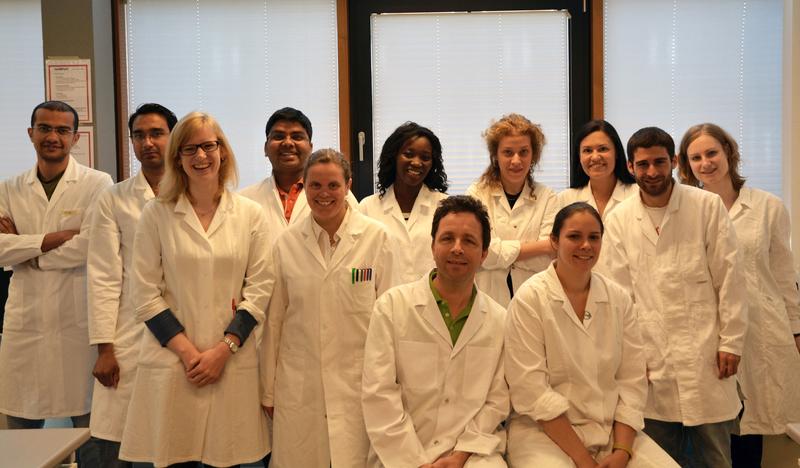

The research group of Professor Sebastian Springer (sitting in the first row) at Jacobs University Bremen.
Photo: Jacobs University
When herpesviruses infect a cell and multiply, they can be detected by the T cells of the immune system because the infected cell will show certain proteins on its surface, the so-called MHC-I proteins. These proteins act as a warning signal: they bind other proteins on the surface of the T cell and activate it to destroy the virus-infected cell.
The herpesvirus MCMV blocks this warning signal: it contains a factor, known as gp40, that prevents the transport of the MHC-I proteins to the cell surface. The virus evades the immune response, and so gp40 belongs to the class of the immuno-evasins.
The Springer group, supported by DFG and the Tönjes Vagt Foundation of Bremen, have now gathered decisive insights into how the gp40 immunoevasin achieves its function. Springer describes the processes with a simple analogy: “Imagine that gp40 has two hands. With one hand, It holds on to a fixed point within the cell, and with the other hand, it grabs the MHC-I protein.
Of course now, the MHC-I protein can no longer make its way to the cell surface.” Springer’s PhD student, Venkat Raman Ramnarayan, has managed to identify this fixed point in the cell interior, and it turned out to be a cellular protein called TMED10, with which the Springer Lab was already familiar. “We were very well equipped to investigate the interaction between gp40 and TMED10”, says Springer. “And now, we also know how the MCMV virus can escape from the immune response.”
The results, which have already been published in the prestigious journal “Cell Reports”, are not directly useful for patients, yet they do lay the foundation for future therapies which can strengthen and support the immune response against viral infections.
Source:
Cell Reports 23 (2018), 3068-3077
https://www.cell.com/cell-reports/pdf/S2211-1247(18)30750-2.pdf
Questions will be answered by:
Prof. Dr. Sebastian Springer | Professor of Biochemistry and Cell Biology
s.springer@jacobs-university.de | Tel.: +49 421 200-3243
http://springergroup.user.jacobs-university.de/news/
About Jacobs University Bremen:
Studying in an international community. Obtaining a qualification to work on responsible tasks in a digitized and globalized society. Learning, researching and teaching across academic disciplines and countries. Strengthening people and markets with innovative solutions and advanced training programs. This is what Jacobs University Bremen stands for. Established as a private, English-medium campus university in Germany, it is continuously achieving top results in national and international university rankings. Its almost 1,400 students come from more than 100 countries with around 80% having relocated to Germany for their studies. Jacobs University’s research projects are funded by the German Research Foundation or the European Research Council as well as by globally leading companies.
For more information: https://www.jacobs-university.de
https://www.facebook.com/jacobs.university
https://www.youtube.com/user/JacobsUni
https://twitter.com/jacobs_bremen
https://www.instagram.com/jacobsuniversity/
https://www.weibo.com/jacobsuniversity
Thomas Joppig | Corporate Communications & Public Relations
Jacobs University Bremen gGmbH
Campus Ring 1 | 28759 Bremen | Germany
Phone: +49 421 200 4504 | Fax +49 421 200 494504
t.joppig@jacobs-university.de
https://www.jacobs-university.de
Commercial registry: Amtsgericht Bremen, HRB 18117
President/ Managing Director: Prof. Dr. Michael Hülsmann (Geschäftsführer)
Chair Board of Governors: Prof. E. Jürgen Zöllner (Aufsichtsratsvorsitzender)















